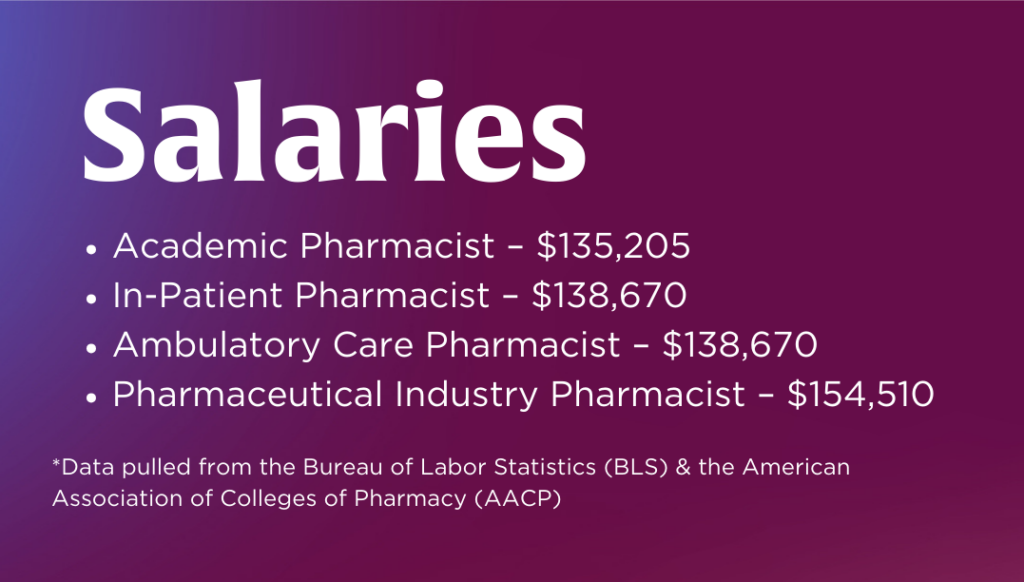Embarking on a journey in the field of pharmacy opens an array of possibilities, each offering unique avenues for professional growth and impact. From traditional roles in community or hospital pharmacies to innovative paths in research, consulting, or the pharmaceutical industry, the world of pharmacy is loaded with career opportunities that cater to a wide range of interests and aspirations. Aspiring pharmacists can navigate this diverse landscape to carve out a fulfilling career that aligns with their passions and goals, shaping the future of healthcare with their expertise and dedication. Pharmacy is not just dispensing medications. Join us as we embark on a journey exploring some of the job opportunities that await in this ever-evolving profession.
Inpatient Pharmacist
Inpatient Pharmacists, also known as hospital pharmacist, are employed in hospitals or healthcare facilities. This type of pharmacist collaborates with healthcare teams to ensure appropriate medication use, manage drug therapies, and oversee pharmacy operations. According to the American Society of Health-System Pharmacists (ASHP), inpatient pharmacists strive to integrate clinical, distributive, and operational functions while focusing on improving patient outcomes, precepting students, and improving medication safety.
Depending on the level of post-graduate training and/or experience, the responsibilities of an Inpatient Pharmacist may include:
- Medication Management: Inpatient Pharmacists review medication orders, ensure appropriate dosing, and check for potential drug interactions or allergies. They work closely with healthcare teams to develop and adjust medication regimens.
- Patient Consultation: Inpatient Pharmacists often meet with patients to discuss their medications, potential side effects, and proper administration techniques. They may also provide counseling on lifestyle modifications and answer any questions patients may have about their medications.
- Clinical Monitoring: Inpatient Pharmacists monitor patients’ responses to medications, including their lab values and vital signs, to ensure the medications are effective and safe.
- Medication Reconciliation: Inpatient Pharmacists ensure that patients’ medication lists are accurate and up-to-date, especially during transitions of care such as admission, transfer, and discharge to prevent medication errors.
- Drug Information: Inpatient Pharmacists serve as a resource for healthcare providers, offering guidance on drug selection, dosing, and administration. They also stay updated on new medications and treatment guidelines.
- Pharmacy Operations: In addition to Inpatient Pharmacists’ clinical roles, Inpatient Pharmacists oversee the distribution and management of medications within the hospital, ensuring that medications are stored and dispensed properly.
- Quality Improvement: Inpatient Pharmacists participate in quality improvement initiatives to enhance medication safety and patient outcomes, such as medication use evaluations and adverse drug reaction monitoring.
Inpatient pharmacists play a crucial role in the healthcare team, contributing to the safe and effective use of medications in hospitalized patients.
Ambulatory Care Pharmacist
Ambulatory Care Pharmacists are similar to inpatient pharmacists, but work in healthcare settings outside of hospitals such as clinics or long-term care facilities, providing direct patient care, medication therapy management for chronic medical conditions, and participating in interdisciplinary healthcare teams. According to the American College of Clinical Pharmacy, ambulatory care pharmacists are frequently granted patient care privileges by collaborating physicians and/or health systems that allow them to perform a full range of medication decision-making functions as part of the patient’s healthcare team. These privileges are granted based on the clinical pharmacist’s demonstrated knowledge of medication therapy and record of clinical experience. This specialized knowledge and clinical experience is usually gained through residency training and specialist board certification.
Pharmaceutical Industry Pharmacist
Pharmacists in the pharmaceutical industry work in areas such as research and development, drug manufacturing, regulatory affairs, or sales and marketing of pharmaceutical products.
- Drug Development: Pharmaceutical Industry Pharmacists are involved in the research and development of new drugs, working alongside scientists and researchers to identify potential new medications, conduct clinical trials, and ensure compliance with regulations.
- Regulatory Affairs: Pharmaceutical Industry Pharmacists ensure that all drugs comply with regulatory requirements and submit applications to regulatory agencies for drug approval. This involves keeping up-to-date with changing regulations and guidelines.
- Quality Control: Pharmaceutical Industry Pharmacists oversee the manufacturing process to ensure that drugs are produced consistently and meet quality standards. This includes testing drugs for efficacy, purity, and safety.
- Clinical Research: Pharmaceutical Industry Pharmacists conduct and oversee clinical trials to evaluate the safety and efficacy of new drugs. This involves designing protocols, monitoring trials, and analyzing data.
- Drug Information: Pharmaceutical Industry Pharmacists provide information and education about medications to healthcare professionals, patients, and the public. This includes information about drug interactions, side effects, and dosage.
- Product Management: Pharmaceutical Industry Pharmacists manage the lifecycle of a drug, from development through to its discontinuation. This includes assessing market needs, developing marketing strategies, and managing product launches.
- Pharmacovigilance: Pharmaceutical Industry Pharmacists monitor and report adverse drug reactions and other safety issues related to medications. This helps ensure that drugs on the market are safe for use.
- Medical Affairs: Pharmaceutical Industry Pharmacists provide medical expertise and support to various departments within the pharmaceutical company, including marketing, sales, and research.
Pharmaceutical Industry Pharmacists play a crucial role in the development, manufacturing, and monitoring of medications to ensure they are safe, effective, and of high quality.

Academic Pharmacist
Academic Pharmacists are employed in educational institutions, where they teach pharmacy students, conduct research, and contribute to the advancement of pharmacy practice and education.
The responsibilities of an Academic Pharmacist may include:
- Teaching: Academic Pharmacists teach pharmacy students, healthcare professionals, and sometimes the public about various aspects of pharmacy practice, including pharmacology, therapeutics, and patient care.
- Precepting Students: Academic Pharmacists may supervise and mentor pharmacy students during their experiential rotations, providing guidance and feedback on their clinical skills and patient care.
- Curriculum Development: In some instances, Academic Pharmacists may be involved in developing and updating pharmacy curricula to ensure that students receive relevant and up-to-date education.
- Clinical Practice: Some Academic Pharmacists maintain a clinical practice in addition to their academic responsibilities, providing direct patient care in hospitals, clinics, or other healthcare settings.
- Research: Academic Pharmacists often conduct research in areas such as drug discovery, pharmacokinetics, pharmacoeconomics, and medication therapy management. They may publish their findings in scientific journals and present them at conferences.
- Service: Academic Pharmacists may serve on committees within their institution or professional organizations, contributing to the advancement of the pharmacy profession.
- Collaboration: Academic Pharmacists collaborate with other healthcare professionals, researchers, and industry partners to advance pharmacy practice and improve patient care.
Academic Pharmacists play a crucial role in educating the next generation of pharmacists, advancing pharmacy practice through research, and contributing to the overall body of knowledge in the field of pharmacy.
 Why Choose Pharmacy?
Why Choose Pharmacy?
According to the U.S. Bureau of Labor Statistics, the job outlook for pharmacy is promising with the employment of pharmacists projected to grow 3 percent between now and 2032 with the demand expected to increase for pharmacists in some healthcare settings such as hospitals and clinics. The BLS goes on to state that as the roles of pharmacists expand beyond traditional drug-dispensing duties, pharmacists increasingly will be integrated into healthcare teams to provide medication management and other patient care services in these facilities.
A career in Pharmacy is promising with an array of opportunities available. Remember Pharmacy is not just dispensing medications, it’s so much more.
Start Your Pharmacy Journey With Roseman University
The Roseman University College of Pharmacy is committed to equipping future pharmacists with the knowledge and skills required to make an impact in healthcare. Choose from a three-year accelerated Doctor of Pharmacy (PharmD) program or a four-year Dual Accelerated PharmD/MSPS 3+1 Program, both of which are set up to help graduates jumpstart their career in pharmacy.
 Why Choose Pharmacy?
Why Choose Pharmacy?